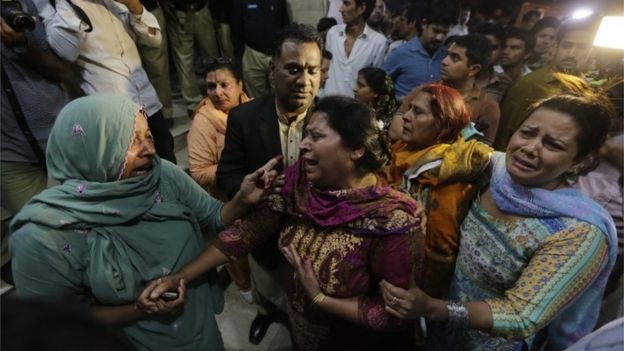Terrorism strikes again five days later. On Holy Easter Sunday. At least 72 killed, many of them children.
One received extensive front page news coverage for a couple of days, and the other was barely mentioned in the front page on the day after.
 |
| From the BBC |
It is the same old story all over again. When terrorists strike in Western Europe or North America, it is serious news. When terrorists strike and kill way more people in the brown-skinned world, the attitude is pretty much along the lines of "who cares!" As Rafia Zakaria notes in this op-ed:
Two days after Sunday’s attack, Lahore has disappeared from the top headlines. Pakistan’s pain has already been extinguished from the global news cycle, its catastrophe a news item and not — as in Paris or Brussels — a news event.A hundred, two hundred years ago, it was the white skinned who terrorized the brown skins. Take the case of Belgium, which was the recent site of terrorism in Western Europe, and Leopold,who was its king towards the end of the 19th century. Even a simple Google search attempt results in this autofill:
Why is it referred to as a genocide in the Belgian Congo? I have excerpted the following from an old (1998) New York Times article that I tracked down; it is a review of the book that I have also used as the title for this post:
Under the reign of terror instituted by King Leopold II of Belgium (who ran the Congo Free State as his personal fief from 1885 to 1908), the population of the Congo was reduced by half -- as many as 8 million Africans (perhaps even 10 million, in Hochschild's opinion) lost their lives.Perhaps based on all the data, somebody has already done calculations somewhere on how many brown skins equals one white skin.
Some were beaten or whipped to death for failing to meet the rigid production quotas for ivory and rubber harvests, imposed by Leopold's agents. Some were worked to death, forced to labor in slavelike conditions as porters, rubber gatherers or miners for little or no pay.
Some died of the diseases introduced to (and spread throughout) the Congo by Europeans. And still others died from the increasingly frequent famines that swept the Congo basin as Leopold's army rampaged through the countryside, appropriating food and crops for its own use while destroying villages and fields.
I am, yet again, reminded of the narrow-minded empathy that we often tend to display:
It favors vulnerable children and animals, and discriminates against unattractive people. You’re more likely to sympathize with someone in your social group rather than an outsider, especially one who looks different.The typical European looks more like the majority American and, thus, they are all in the same "social group" that triggers the tsunami of empathy?
At some point, the earlier the better, we need to truly, genuinely, understand that a human life somewhere in the world is as much a human life in any other part of the world. The more we fail to even acknowledge this, and the more we continue to behave as if some humans are infinitely more valuable than others, I worry that we will face decades of bloodshed ahead.

2 comments:
Alas, much of what you write is true. But a shining exception in the BBC. I listen to its podcasts every day and there was so much coverage of every dimension of the tragedy in Pakistan. Although this was supposed to be an attack on Christians, more Muslims died in the carnage than Christians. There was a moving piece on how this tragedy actually brought Christians and Muslims together in shared grief - they shared in attending funerals, helping the victims, etc. There was another moving piece about a Muslim doctor who was donating blood while at the same time treating a Christian family that was injured. Apparently hospitals have been overwhelmed with people donating blood.
I hadn't realised the extent of the genocide during King Leopold's reign. Worse than what even happened in the recent past.
While the BBC coverage is to be commended, the British/BBC interest in Pakistan and the Subcontinent itself is not unconnected to the colonial history. Nonetheless, yes, at least there is BBC's extensive and continued coverage.
Yes, I have often joked that if there was no way but to have experienced European colonialism, then at least it was the British who screwed up India because to have had any other white skinned overlord would have been even more disastrous. The French were hell bent on remaking their colonies with French culture, food, language ... the Belgians and the Dutch were barbaric ... Spain and Portugal were maniacal about enriching themselves while looting their colonies and messing up the people in every possible way including by imposing Christianity ... so, yes, it could have been worse; at least it was only the likes of Robert Clive and Gen. Dyer all the way down to the bastard "statesman" Churchill ;)
Post a Comment